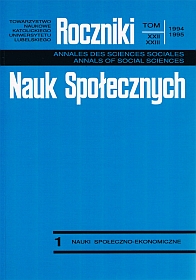The Legal Situation of Poles in the Federal Republic of Germany (in the '80s)
Abstract
Ausländergesetz of 1965, which replaced Ausländerpolizeiverordnung of 1938. Aside to this basic document the explaining legal instructions included in Arbeitserlaubnisverordnung, Verwaltungsrichtlinien, and Ausländergewerblichtlinien were also important. Foreigners could appeal to the basic rights contained in the Constitution, such as the right to choose the place of residence (art. 11), to rally, associate and choose their own profession (art. 8, 9, subparagraph 1, 12), free development of one’s personality (art. 5, subparagraph 1), equal treatment, (art. 3), free expression of their opinions (art. 5, subparagraph 1). In practice the right to protect marriage and family (art. 6, subparagraph 1) was especially critical. In many cases it facilitated the reception of the right of arrival and stay in the Federal Republic of Germany.
The paper does not discuss all issues which compose the legal situation of foreigners, including Poles in the Federal Republic of Germany, but is confined to the most essential ones, such as: visa law and right to stay, right to asylum, right to labour, right to vote, that is the socalled communal rights.
In the above domain of social life the law, as well as its interpretation and its execution by respective officers, relegates foreigners, including Poles, to disabled groups. This creates for them especially difficult conditions for life and development. This has also other effects, most certainly intended by the lawgivers. On the one hand it restrains Poles from permanent settling in the Federal Republic of Germany; on the other hand it accelerates denationalization of those who has decided to live in a new society. In order to get a chance to develop in it many Poles seek to become Germans quickly to have equal rights in all domains of life.
Copyright (c) 1995 Roczniki Nauk Społecznych

This work is licensed under a Creative Commons Attribution-NonCommercial-NoDerivatives 4.0 International License.


